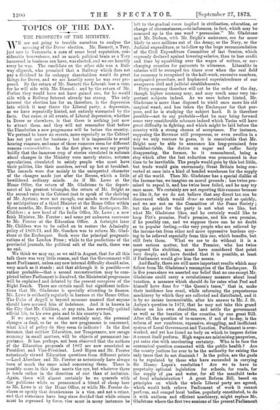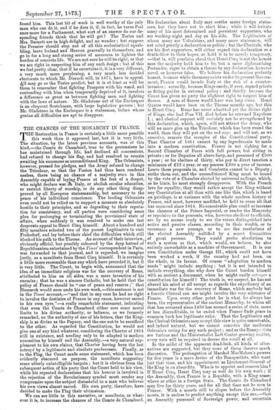TOPICS OF THE DAY.
THE PROSPECTS OF THE MINISTRY.
WE are not going to trouble ourselves to analyse the meaning of the Dover election. Mr. Barnett, a Tory, just now in Venezuela, a man of some local reputation, con- siderable benevolence, and as much political brain as a Tory immersed in business can have, was elected, and we are heartily sorry he was. The candidate on the other side was a Rail- way oligarch, who promised that a Railway which does not pay a dividend to its unhappy shareholders would do great things for Dover, and we are heartily sorry he was ever pro- posed. By the return of Mr. Barnett the Liberals lose a vote, for he will side with Mr. Disraeli ; and by the return of Mr. Forbes they would have not have gained one, for he would side with a Railway Interest already too strong. The only interest the election has for us, therefore, is the depression into which it may throw the Liberal party, a depression, as we have repeatedly hinted, not entirely warranted by the facts. One cause, at all events, of Liberal depression, whether in Dover or elsewhere, is that there is nothing just now to attract them, and they will not remember that before the Dissolution a new programme will be before the country. We pretend to know no secrets, more especially as the Cabinet has not yet met for business ; but it is impossible to avoid hearing rumours, and some of those rumours seem for different reasons vraisemblables. In the first place, we may say pretty boldly that the immense crop of stories circulated in autumn about changes in the Ministry were merely stories, autumn speculations, circulated to satisfy people who must have their politics, like their murders, served up hot at breakfast. The canards were due mainly to the unexpected character of the changes made just after the Recess, which a little bewildered ordinary minds. As if Mr. Lowe at the Home Office, the return of Mr. Gladstone to the depart- ment of his greatest triumphs, the return of Mr. Bright as the second voice in the Cabinet (not to speak of the shelving of Mr. Ayrton), were not enough, our minds were distracted by anticipations of a third Minister at the Home Office within three months, Mr. Bouverie ; a third at the Exchequer, Mr. Childers ; a new head of the India Office, Mr. Lowe ; a new Irish Minister, Mr. Forster ; and some yet unknown successor to Mr. Forster at the Education Office. A fortnight later Mr. Childers was to be called on to restore the Admiralty policy of 1869-71, and Mr. Goschen was to relieve Mr. Glad- stone at the Exchequer. Such were the principal prognosti- cations of the London Press ; while to the predictions of the provincial journals, the political salt of the earth, there was no end.
We think we may say, as we said in August, that for all this talk there was very little reason, and that the Government will meet Parliament, unless any new internal difficulty should arise, very much as it stands ; and that although it is possible—or rather probable—that a second reconstruction may be com- pleted before Parliament is dissolved, the Ministerial programme will be explained and debated by the present occupiers of the Right Bench. There are certain small but significant indica- tions that Mr. Gladstone is specially attending to finance. Mr. Lowe is evidently regularly in harness at the Home Office. The Duke of Argyll is beyond measure amazed that anyone should have accused him of indolence. And it is known in the City that Mr. Childers, at any rate, has avowedly quitted official life, to his own gain and to his country's loss.
If we accept, as we almost certainly may, the personal changes as final, so far as the new programme is concerned, what kind of policy do they seem to indicate ? In the first instance, that neither Education, nor Temperance, nor savage economy in small matters, will be objects of paramount im- portance. it has, perhaps, not been observed that the authors of the Education proposals of 1867 are now associated as President and Vice-President. Lord Ripon and Mr. Forster notoriously viewed Education questions from different points —Lord Aberdare and Mr. Forster as notoriously have always been of much the same mind concerning them. There is possibly more in this than meets the eye, but whatever there is tends rather in the direction of rest than of irritation. Again, there will almost certainly be no quarrels with the publicans while so pronounced a friend of cheap beer as Mr. Lowe is at the Home Office, or while Mr. Forster de- clares so openly that drunkenness is a vice, and not a crime, and that statesmen have long since decided that while crimes must be repressed by force, vice must in many instances be left to the gradual cures implied in civilisation, education, or- change of circumstances,—to influences, in fact, which may be•
summed up in the one word " persuasion." Mr. Gladstone. and Mr. Dodson, with Mr. Bright's assistance, are far more- likely to save millions out of the Army, or the Navy, or the Judicial expenditure, or to follow up the large recommendation of the Civil Expenditure Committee of last Session, which expressly declared against lowering salaries, than to lose credit and time by squabbling over the wages of writers, or sur- charging counties for payments to witnesses. Liberality in salaries will be recouped ten times over when the real field for economy is recognised in the half-work, excessive numbers, antiquated procedure, and haphazard superintendence of our- overgrown civil and judicial establishments.
Petty economy therefore will not be the order of the day, though higher economy may, and may reach some very im- portant subjects indeed. As we once before hinted, Mr. Gladstone is more than disposed to wield once more his old- magical wand, and has taken the Exchequer for that pur- pose, and he is studying the subject hard. It is therefore- possible—not to say probable—that he may bring forward some very considerable schemes indeed which Tories will have• great difficulty in fighting, and which might be laid before the- country with a strong chance of acceptance. For instance, supposing the Revenue still prosperous, or even swollen in a way we only venture to guess, it is conceivable that Mr. Bright may be able to announce his long-promised free breakfast-table, the duties on sugar and coffee fairly disappearing, the former, be it remembered, being a step which after the last reduction was pronounced in due- time to be inevitable. The people would gain by this but little,. but trade would gain enormously, Great Britain being con- verted at once into a kind of bonded warehouse for the supply of all the world. Then Mr. Gladstone has a special dislike of the Income-tax, we imagine on moral grounds ; has twice pro- mised to repeal it, and has twice been foiled, and he may try once more. We certainly are not reporting this rumour because we like it, for we do not believe that any direct tax can be discovefed which would draw so certainly and so quickly, and we are not on the Committee of the Peace Society but the point for the party is not what we like, but what Mr. Gladstone likes, and he certainly would like to keep Pitt's promise, Peel's promise, and his own promise, if he possibly can, and we suppose there can be no doubt as to popular feeling,—the very people who are relieved by the income-tax from other and more oppressive burdens cry- ing to be relieved especially from this one, which benefits, but.
still frets them. What we are to do without it is a most serious matter, but the Premier, who has twice proposed the abolition, must have considered that point very deeply, and have decided that it is possible, at least. if Parliament would give him the means.
And finally, there are still more important results which may follow from Mr. Gladstone's resumption of the Exchequer. It is five years since we asserted our belief that no one except Mr. Gladstone could carry a revolutionary measure about local taxation, a measure which should do for rates what Peel and himself have done for " the Queen's taxes," that is, make their incidence less cruel, while reforming the preposterous machinery by which they are collected and distributed, and it is by no means inconceivable, after his answer to Mr. J. St. Aubyn's question in 1872, that he may not take this grand labour on his own shoulders, and settle the government as well as the taxation of the counties, by one great Bill- After all, the question of to-morrow, if not of to-day, is the reform of our cumbrous, expensive, straggling, and inefficient system of Local Government and Taxation. Parliament is over- worked, and yet has found no body on which to impose duties it cannot itself perform. High wages are minimising pauperism, yet rates rise with unrelenting certainty. Who is to face the economical question connected with the public health V Are the county justices for ever to be the authority for raising the only taxes that do not diminish ? Is the police, are the gaols to be regulated by those who have succeeded in carrying Sir Massey Lopes's resolution V Are we to have in perpetuity optional legislation for schools, for roads, for the supply of gas and water, for all the manifold tasks of local administration ? A great Reform Bill, based on principles on which the whole Liberal party are agreed, which would both relieve Parliament of work it cannot perform, and compel local bodies, popularly constituted, to do it with uniform and efficient machinery, might replace Mr. Gladstone where the first two sessions of the present Parliament
found him. This last bit of work is well worthy of the only man who can do it, and if he does it, if, in fact, he turns Peel once more for a Parliament, what sort of an answer do our de- sponding friends think that he will get ? The Tories and Mrs. Barnett are in high delight, and no wonder ; but suppose the Premier should step out of all this ecclesiastical squab- bling, leave Ireland and Heaven generally to themselves, and go in for a long and strong series of measures to lighten the burden of concrete life. We are not sure he will be right, or that we are right in suspecting him of any such design ; but of this we feel pretty clear, that if he entertains it, it is a very different, a very much more perplexing, a very much less decided electorate to which Mr. Disraeli will, in 1874, have to appeal. 411 may go as the Tories predict, but it is at least as well for them to remember that fighting Prospero with his wand, and contending with him when temporarily deprived of it, involves a difference as great as between fighting men and fighting with the laws of nature. Mr. Gladstone out of the Exchequer is an eloquent Scotchman, with large legislative powers ; but Mr. Gladstone in the Exchequer is a statesman, before whose genius all difficulties are apt to disappear.



































 Previous page
Previous page